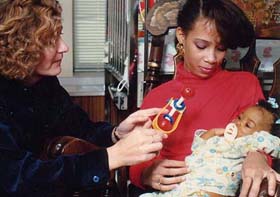ESSE 637:
Infant/Family Intervention and Teamwork
 Mission Statement of the Darden College of Education
Mission Statement of the Darden College of Education
Old Dominion University’s major purpose in its education program is to prepare individuals who have knowledge of their discipline, ability to practice state-of-the-art instruction with students of various cultural and socioeconomic backgrounds, and attitudes which reflect commitment to teaching and learning as well as lifelong professional growth and development.
Course Description
This course prepares professionals from cross-discipline backgrounds to serve families with children who are at-risk and disabled from birth through age three. Emphasis is placed IFSPs, procedures, materials and curricula for this population.
Course Purpose
The purpose of this course is to train professional educators in early childhood special education. Students will be given a broad introduction to the curricula, methods, and materials used in effective intervention with infants and toddlers who are at-risk and/or with disabilities, and their families. The course presents a family-centered approach and places an emphasis on transdisciplinary teamwork.
Course Competencies
The objectives of this course are aligned with the Council for Exceptional Children’s (CEC) standards. The following are the professional standards for Early Childhood Special Educators.
Students will demonstrate written mastery in the following knowledge competency areas:
Standard 1 - Foundations
- Knowledge of trends and issues in early intervention and Early Childhood Special Education.
- Knowledge of laws and policies that affect young children, families, and programs for young children.
Standard 2 - Development and Characteristics of Learners
- Knowledge of the biological and environmental factors on pre-, peri-, and post-natal development.
- Knowledge of the influences of stress and trauma, protective factors and resilience, and supportive relationships on the social and emotional development of young children.
- Knowledge of the significance of socio-cultural and political contexts for the development and learning of young children who are culturally and linguistically diverse.
- Knowledge of common characteristics of disabilities, including assessment and intervention techniques.
- Knowledge of typical and atypical processes and stages of development (0-3).
Standard 4 - Instructional Strategies
- Knowledge of language development and disorders and methods of early communication facilitation and intervention for infants and toddlers.
- Knowledge of the principles of family-centered intervention, including ability to foster positive parent-child interactions and parental confidence.
- Knowledge of techniques for observing and recording behavior of individual children.
Standard 5 - Learning Environments/Social Interactions
- Knowledge of medical care and issues for premature, low-birth-weight, and other young children with medical and health conditions.
Standard 7 - Instructional Planning
- Knowledge of the skill in designing, implementing, and monitoring Individualized Family Service Plans (IFSP), including developing goals for family-centered outcomes, and data collection systems.
Standard 9 - Professional and Ethical Practice
- Knowledge of organizations and publications relevant to the field of ESCE.
Standard 10 - Collaboration
- Knowledge of the dynamics of teams: team-building, problem-solving, and conflict resolution.
Students will be able to demonstrate mastery in the following skill competency areas:
Standard 6 - Language
- Ability to use communication/language facilitation techniques such as parallel talk, expansion, and following child’s topic.
Standard 7 - Instructional Planning
- Ability to plan intervention strategies with young children and their families that affirm and respect family, cultural and linguistic diversity.
- Ability to use instructional practices based on knowledge of the child, family, community, and curriculum.
- Ability to use knowledge of future educational settings and plan successful transitions for children and families.
- Ability to implement, monitor, and evaluate Individualized Family Service Plans.
- Ability to plan and implement developmentally and individually appropriate curriculum.
- Ability to use anticipatory guidance and intervention coaching to support families with infants and toddlers with disabilities.
- Ability to develop a trusting and productive relationship with young children, and their families.
- Ability to work effectively as a team member with a variety of professionals.
- Ability to recognize one’s limitations and to seek assistance when appropriate.
Standard 8 - Assessment
- Ability to design intervention strategies incorporating information from multiple disciplines.
- Ability to assist families in identifying their concerns, resources and priorities.
Standard 9 - Professional and Ethical Practice
- Ability to use family theories, family choices to guide professional practice.
- Ability to apply models of team process in early intervention and ECSE.
- Ability to apply research and effective practices critically in early childhood settings.
- Ability to develop characteristics and philosophy of a professional educator who contributes to their field.